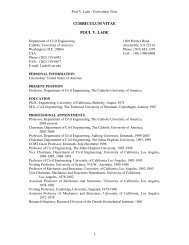Nota Bene-- C:\ARTICLES\TERMIN~1.NB Job 1 - the Catholic ...
Nota Bene-- C:\ARTICLES\TERMIN~1.NB Job 1 - the Catholic ...
Nota Bene-- C:\ARTICLES\TERMIN~1.NB Job 1 - the Catholic ...
You also want an ePaper? Increase the reach of your titles
YUMPU automatically turns print PDFs into web optimized ePapers that Google loves.
affirmed by D. J. Williams, Paul’s Metaphors: Their Context and Character (Peabody:<br />
Hendrickson, 1999) 291 n. 141: “But clearly <strong>the</strong>y [Israel] were not seeking a law. They would<br />
say that <strong>the</strong>y had a law already by which to live--<strong>the</strong> law of Moses. What <strong>the</strong>y were seeking was<br />
<strong>the</strong> righteousness that came from obedience to that law...The righteousness that <strong>the</strong>y were<br />
seeking is simply understood.” See also Martin, Christ and <strong>the</strong> Law, 137.<br />
only twice.<br />
10 In 9:30-31 “righteousness” (δικαιοσυ' νη) occurs a striking four times but “Law” (νο' µος)<br />
11 Contra Moo, Romans, 626: “Paul <strong>the</strong>refore explains in v. 32a why Israel’s pursuit of this<br />
‘law for righteousness’ failed: because she sought to ‘fulfill’ that law by works ra<strong>the</strong>r than by<br />
faith.” Contra Schreiner (Romans, 539) Paul is not implying here that “those who pursued <strong>the</strong><br />
law in faith would, <strong>the</strong>refore, believe in Christ, for <strong>the</strong>y would perceive that <strong>the</strong> law pointed to<br />
him.”<br />
12 As 3:31 indicates, this does not mean that <strong>the</strong> Law is nullified through faith.<br />
13 J. Lambrecht, “Why Is Boasting Excluded? A Note on Rom 3,27 and 4,2,” ETL 61<br />
(1985) 365; Moo, Romans, 247-50.<br />
14 Contra Schreiner, Romans, 540: “...<strong>the</strong>re is probably an implicit ‘<strong>the</strong>refore’ joining<br />
verses 32a and 32b.”<br />
15 That Rom 9:32a should not be regarded as an ellipsis but taken as a paren<strong>the</strong>sis with <strong>the</strong><br />
verb “stumbled” in 9:32b--”Why? Because <strong>the</strong>y (not from faith [in Christ] but engrossed in<br />
works) stumbled”--is argued by W. Reinbold, “Paulus und das Gesetz: Zur Exegese von Röm<br />
9,30-33,” BZ 38 (1994) 253-64. But <strong>the</strong> asyndeton separating 9:32a and 9:32b rules this out; see<br />
Schreiner, Romans, 540 n. 18; J. Lambrecht, “The Caesura Between Romans 9.30-3 and 10.1-4,”<br />
NTS 45 (1999) 146 n. 22. According to Lambrecht (p. 146), “In 9.30-3 Paul seems to deplore<br />
two ‘failures’ with regard to Israel: ‘working’, i.e., concretely speaking, striving to do <strong>the</strong> works<br />
of <strong>the</strong> law, and not accepting Jesus. The two failures are related, but not identical.”<br />
16 That <strong>the</strong> stone refers to <strong>the</strong> Law is argued by, among o<strong>the</strong>rs, P. W. Meyer, “Romans 10:4<br />
and <strong>the</strong> ‘End’ of <strong>the</strong> Law,” The Divine Helmsman: Studies on God’s Control of Human Events,<br />
17
















